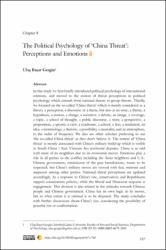| dc.identifier.citation | Gezgin, U. B. (2023). The Political Psychology of ‘China Threat’: Perceptions and Emotions. In: Bayram, A. T. & Asrifan, A. & Sharma, N. & , M. (eds.), Current Approaches in Social Sciences. Özgür Publications. DOI: https://doi.org/10.58830/ozgur.pub167.c748 | en_US |
| dc.description.abstract | In this study we first briefly introduced political psychology of international relations, and moved to the notion of threat perceptions in political psychology which extends from national threats to group threats. Thirdly, we focused on the so-called ‘China threat’ which is mostly considered as a theory, a perception, a discourse or a thesis, but also as an issue, a theme, a hypothesis, a notion, a charge, a narrative, a debate, an image, a coverage, a topic, a school of thought, a public discourse, a story, a perspective, a proposition, a specter, a view, a syndrome, a school, a fear, a sentiment, an idea, a terminology, a rhetoric, a possibility, a mentality, and an atmosphere, in the order of frequency. We also see other scholars preferring to use ‘the so-called China threat’ as they don’t believe it. The notion of ‘China threat’ is mostly associated with China’s military build-up which is visible in South China / East Vietnam Sea territorial disputes. China is at odd with most of its neighbors due to its revisionist moves. Emotions play a role in all parties to the conflict including the Asian neighbors and U.S.. Chinese government, reminiscent of the past humiliations, wants to be respected; but China’s military moves are viewed with fear, mistrust and suspicion among other parties. National threat perceptions are updated accordingly. As a response to China’s rise, conservatives and Republicans support containment policies, while the liberal and Democrat response is engagement. This division is also related to the attitudes towards Chinese people and Chinese government. China has its own logic in its moves, but to what extent it is rational is to be disputed. The study concludes with further discussions about China’s rise, considering the possibility of peaceful rise or confrontation. | en_US |

















